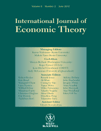
International Journal of Economic Theory
Scope & Guideline
Pioneering insights in the realm of economic theory.
Introduction
Aims and Scopes
- Theoretical Foundations of Economic Models:
The journal prioritizes the development and analysis of theoretical models that address fundamental economic questions, often utilizing advanced mathematical frameworks. - Market Structure and Competition:
A significant focus is on understanding different market structures, including oligopoly and duopoly settings, and their implications for competition policy and market outcomes. - Welfare Economics and Policy Implications:
Research frequently explores the welfare effects of economic policies, including taxation, regulation, and environmental policy, providing insights into their implications for social welfare. - Behavioral Economics and Decision-Making:
The journal includes contributions that analyze decision-making processes, incorporating behavioral aspects and their effects on economic outcomes. - Environmental Economics:
A consistent area of focus is the intersection of economics and environmental issues, examining topics like corporate social responsibility, pollution control, and international environmental agreements.
Trending and Emerging
- Digital Economy and Platform Competition:
Recent publications indicate a growing interest in the economics of digital platforms, addressing competition policy and market dynamics in the context of a digital economy. - Environmental and Sustainability Economics:
There is a notable increase in research focused on environmental issues, particularly the economic implications of sustainability practices and corporate social responsibility. - Dynamic and Evolutionary Game Theory:
Emerging themes include the use of dynamic and evolutionary models to analyze strategic interactions, reflecting a shift towards more complex and realistic representations of economic behavior. - Labor Market Frictions and Inequality:
An increasing number of studies are dedicated to understanding labor market dynamics, including the effects of frictions and policies on wage inequality and employment. - Interdisciplinary Approaches to Economic Theory:
The journal is increasingly publishing work that integrates insights from other disciplines, such as behavioral economics and political economy, to enrich economic theory and its applications.
Declining or Waning
- Traditional Trade Theory:
There appears to be a reduced emphasis on classical trade theories, as newer models and frameworks dominate the discussions, focusing more on the complexities of modern trade dynamics. - Static Equilibrium Models:
Research centered on static equilibrium analyses is becoming less frequent, with a shift towards dynamic models that account for changes over time and the effects of various shocks. - Simple Behavioral Models:
The journal is moving away from simplistic behavioral models in favor of more complex frameworks that better capture the nuances of decision-making in economic contexts. - Basic Taxation Models:
Basic models of taxation without considering broader economic implications are appearing less frequently, as the focus shifts to more integrated approaches that include welfare and behavioral responses. - Historical Economic Analysis:
The frequency of papers focusing solely on historical economic analysis has declined, as contemporary issues and theoretical advancements gain more attention.
Similar Journals

Theoretical Economics
Exploring the Frontiers of Economic TheoryTheoretical Economics, published by the Econometric Society, is a premier open-access journal dedicated to advancing the field of economics through rigorous theoretical analysis. With an ISSN of 1933-6837 and an E-ISSN of 1555-7561, this journal has been at the forefront of economic scholarship since its inception. Operating out of New York University, it holds a prestigious Q1 ranking in the category of Economics, Econometrics, and Finance, reflecting its influential contributions to the discipline. By making research freely accessible since 2006, Theoretical Economics not only fosters a broader dissemination of knowledge but also promotes collaborative dialogue among economists worldwide. The journal's convergence years span from 2007 to 2024, ensuring ongoing relevance in a rapidly evolving field. Researchers, professionals, and students alike will find Theoretical Economics an essential resource for staying informed about cutting-edge theoretical advancements in economics.
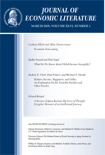
JOURNAL OF ECONOMIC LITERATURE
Fostering informed discourse among global economists.JOURNAL OF ECONOMIC LITERATURE, published by the American Economic Association, stands as a premier academic journal in the field of economics, with a notable Q1 classification in Economics and Econometrics for 2023. Operating from its base in Nashville, TN, this journal has established itself as an indispensable resource for economic researchers and practitioners alike, boasting an impressive Scopus ranking of 10 out of 716—placing it in the top 2% of its category. The journal's commitment to providing comprehensive critical surveys of the literature enhances the understanding of various economic topics, making it a vital tool for researchers seeking to deepen their knowledge or explore new areas of inquiry. Although it operates on a subscription basis, the journal’s high impact on the economics community underlines its importance in advancing the field. With coverage spanning from the 1980s to the present, JOURNAL OF ECONOMIC LITERATURE continues to encourage rigorous scholarship and bridge theoretical and empirical research, enabling informed discourse among economists globally.
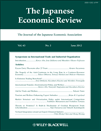
JAPANESE ECONOMIC REVIEW
Decoding economic complexities in Japan and beyond.Japanese Economic Review, published by Springer Heidelberg, is a renowned academic journal that aims to advance the understanding of economic processes within the context of Japan and the Asia-Pacific region. With an ISSN of 1352-4739 and E-ISSN of 1468-5876, this journal features high-quality research articles that span a broad range of topics in economics and econometrics. Ranked in the Q2 category for Economics and Econometrics as of 2023, it holds a Scopus rank of #332 out of 716, placing it in the 53rd percentile among its peers. Although not Open Access, the journal invites contributions that provide insights and empirical analyses beneficial to both academics and practitioners. Emphasizing a deep understanding of economic dynamics, the Japanese Economic Review is essential reading for anyone interested in the implications of economic policies and trends, making it a significant platform for scholarly dialogue and research dissemination.
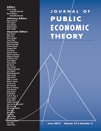
Journal of Public Economic Theory
Pioneering Research in Fiscal and Welfare EconomicsJournal of Public Economic Theory, published by WILEY, is an esteemed journal that focuses on the rigorous analysis and exploration of the theories and applications of public economics. With an ISSN of 1097-3923 and E-ISSN 1467-9779, this journal serves as a pivotal platform for researchers, professionals, and students engaged in economics, finance, sociology, and political science. Ranking in the prestigious Q1 and Q2 quartiles across various categories, including Economics and Econometrics as well as Sociology and Political Science, the journal is recognized for its significant contribution to the field. Its broad scope encompasses critical issues related to public policy, welfare economics, and fiscal policy, catering to an international audience. While the journal is not open access, its articles undergo a stringent peer-review process to ensure high-quality research dissemination. With a commitment to fostering scholarly dialogue and understanding, the Journal of Public Economic Theory remains an essential resource for those seeking to delve into the complexities of public economic issues, with a historical record of publication from 1999 to 2024.
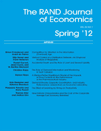
RAND JOURNAL OF ECONOMICS
Elevating the Standards of Economic ResearchRAND JOURNAL OF ECONOMICS, published by Wiley, is a prestigious peer-reviewed journal that has been a cornerstone in the field of economics since its inception in 1984. With a focus on empirical and theoretical research, it aims to bridge the gap between economic theory and real-world application, providing insights that are both rigorous and relevant. The journal holds an impressive Q1 ranking in Economics and Econometrics, reflecting its significant impact and influence in the field, evidenced by its Scopus rank of #199 out of 716 in related categories. Although it does not offer open access, the journal remains accessible to a broad audience through institutional subscriptions. Researchers, professionals, and students will find RAND JOURNAL OF ECONOMICS an invaluable resource for cutting-edge economic analyses and a vital platform for scholarly dialogue about contemporary economic issues.

ECONOMETRICA
Pioneering rigorous insights in econometrics.ECONOMETRICA, published by Wiley, is a leading journal in the field of economics and econometrics, renowned for its rigorous and cutting-edge research contributions. With an ISSN of 0012-9682 and an E-ISSN of 1468-0262, this esteemed journal holds a prestigious position in the academic landscape, classified in the top quartile (Q1) for both Economics and Econometrics as of 2023, and ranked 42 out of 716 in its field, placing it in the 94th percentile according to Scopus metrics. The journal's scope encompasses a diverse range of topics aimed at advancing economic theory and its practical applications, making it an essential resource for scholars, practitioners, and students alike. Although it operates under a subscription model, the depth and quality of research published in ECONOMETRICA underscore its significance as a cornerstone for intellectual discourse and innovation within the field. Based in the United Kingdom, at 111 River St, Hoboken, NJ 07030-5774, ECONOMETRICA continues to attract high-caliber contributions that shape the future of econometric research.

ECONOMIC THEORY
Exploring the Depths of Economic UnderstandingECONOMIC THEORY is a leading academic journal published by Springer, dedicated to advancing the field of economics through the dissemination of innovative and high-quality research. Established in 1991, this journal has become a crucial resource for researchers, professionals, and students interested in theoretical economics and econometrics. With a strong reputation, it ranks in the Q1 category for Economics and Econometrics as of 2023, exemplifying its influence and contribution to the discourse in the field. The journal operates without Open Access options, ensuring that all published content undergoes rigorous peer-review, maintaining scholarly integrity. Scholars can access the journal's rich compendium of articles that delve into diverse economic theories, providing invaluable insights and fostering academic dialogue. Headquartered in Germany, ECONOMIC THEORY is committed to shaping the future of economic research and serving as a cornerstone in the academic community.

Economic Theory Bulletin
Exploring the frontiers of economic thought and application.Welcome to the Economic Theory Bulletin, a premier journal dedicated to advancing the field of economic theory. Published by SPRINGER HEIDELBERG, this journal serves as a critical platform for researchers and professionals to disseminate innovative ideas and research findings that shape economic discourse. With an ISSN of 2196-1085 and an E-ISSN of 2196-1093, the Economic Theory Bulletin invites contributions that address theoretical advancements and empirical applications in economics, fostering insightful dialogue among scholars. Although the journal operates under a traditional access model, it remains committed to high-quality, peer-reviewed scholarship that meets the rigorous standards of the academic community. The diverse range of articles published here not only contributes to the theoretical foundations of economics but also emphasizes real-world applications, making it an essential resource for students and professionals alike. The journal’s impact on the evolving landscape of economic theory ensures that it remains a vital reference point for the latest research and trends in the field.
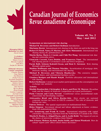
CANADIAN JOURNAL OF ECONOMICS-REVUE CANADIENNE D ECONOMIQUE
Connecting Scholars with Cutting-Edge Economic ResearchThe Canadian Journal of Economics - Revue Canadienne d'Économique is a prestigious academic journal published by Wiley, dedicated to advancing research in the field of economics and econometrics. With its ISSN 0008-4085 and E-ISSN 1540-5982, this journal has been a vital resource since its inception in 1977, offering a platform for the dissemination of high-quality research and scholarly articles. As a distinguished Q2 journal in the 2023 Economics and Econometrics category, it ranks #405 out of 716 within the Scopus database, showcasing its influence and relevance in the academic community. Although it does not feature an open-access model, the journal remains committed to providing rigorous analysis and critical insights that resonate with researchers, professionals, and students alike. Its scope encompasses a wide range of economic disciplines, making it an essential publication for those seeking to stay at the forefront of economic thought and practice.
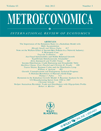
Metroeconomica
Innovating Economic Understanding for a Dynamic World.Metroeconomica is a prestigious journal published by WILEY, focusing on the dynamic fields of Economics and Econometrics. Known for its rigorous peer-review process, this journal prides itself on disseminating high-quality research that informs and inspires scholars and practitioners alike. With an impact factor reflective of its significance in the discipline, Metroeconomica is categorized in the Q2 quartile for 2023, representing its competitive standing among influential economics publications. Since its inception in 1949 and continuing through a converged publication period until 2024, it has contributed significantly to advancing theoretical and empirical knowledge in economics. Researchers can access its content through traditional avenues, encouraging a wide readership among academics and industry experts. As the journal continues to evolve with the changing landscape of economic research, it remains a vital resource for those seeking to explore contemporary economic issues and foster impactful discussions within the field.